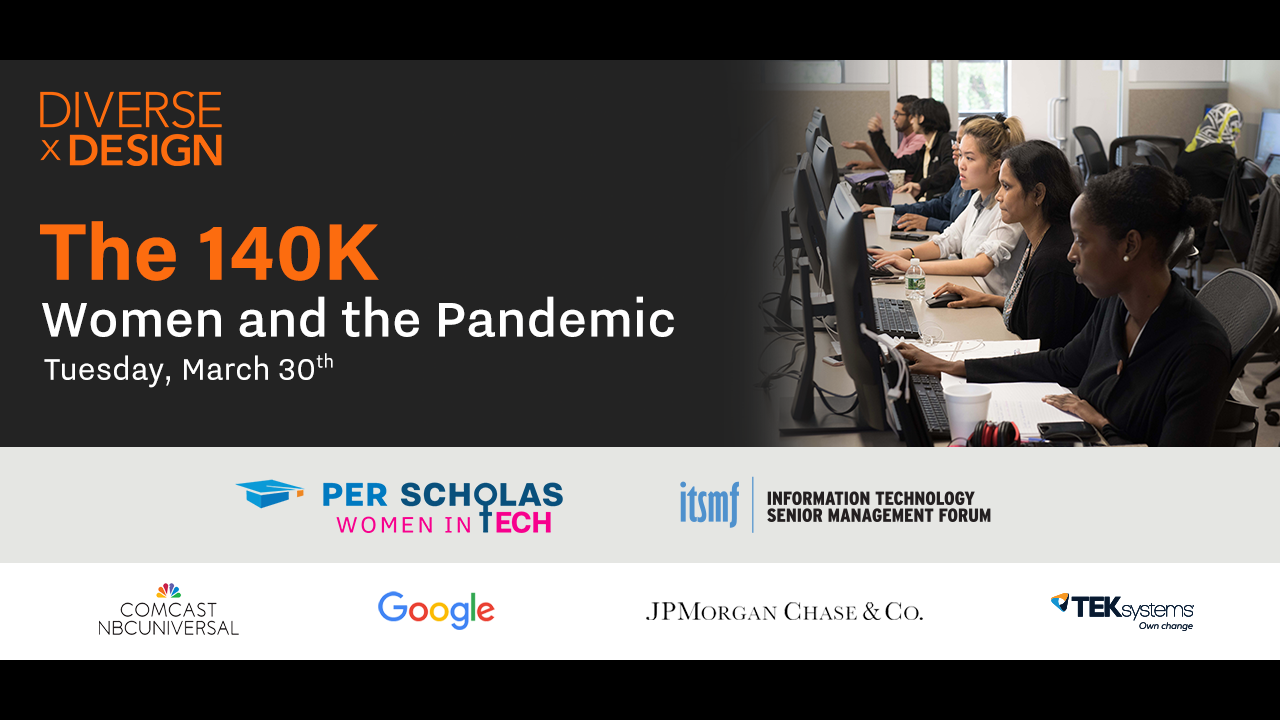Diverse by Design | The 140K: Women and the Pandemic
On March 30th, Diverse by Design (DxD), powered by Per Scholas and the Information Technology Senior Management Forum (ITSMF), held a virtual event dedicated to exploring the unique challenges the COVID-19 pandemic has presented for women in the workforce and the solutions companies are employing to address them.
The event was hosted by Per Scholas Chief Administrative Officer Michelle Pullaro, and was attended by hundreds of viewers from across the country. Multiple speakers were featured, including Stephanie LeBlanc-Godfrey, Global Head of Inclusion for Women of Color, Google; Julie Dillman, Global Head of Operations, Chubb; and Kimberly Jones, People Experience and Talent, Center of Expertise Leader, PwC. The event included an introductory presentation by Per Scholas’s own Toni Cunningham, the Managing Director of Per Scholas’s Columbus campus.
Michelle Pullaro hosted the discussion, and started off by citing the effects of the pandemic on female employment in the U.S. “The labor participation rate in the United States for women is the lowest it’s been in 34 years… Unless we are intentional and work together to find solutions, we’re going to pass up all the progress that we’ve made breaking the glass ceiling, striving for more. We, together, can make a difference.”
The pandemic has unquestionably highlighted the disproportionate way in which caregiving most frequently falls on the shoulders of women. Cunningham informed attendees that the COVID-19 pandemic has seen women leaving the workforce at considerably higher rates than men. Another driver of this trend has been that many of the fields traditionally dominated by women, such as hospitality and retail, have experienced the biggest job cuts during the pandemic. These shifts in industry trends in addition to the added household pressures of the pandemic are driving more women to consider downshifting their careers, or leaving the workforce altogether.
Cunningham also noted that Latina and Black mothers are shouldering an even heavier burden than white mothers, due to the fact that they are statistically more likely to be the sole breadwinners of their families, resulting in this pandemic being particularly devastating for these communities.
Unfortunately, few companies have adjusted their performance criteria to account for the added pressures of the pandemic, forcing many employees — particularly those in caregiver roles — to fall short of pre-pandemic expectations.
“A lot of us are part of the sandwich generation where we’re taking care of both kids and parents,” LeBlanc-Godfrey told viewers. “Many of us are trying to process the pandemic, while we still have business as usual goals and deadlines that have not slowed down…My team and I, we are fiercely working on how to manage all of those things and meet what a lot of women want and what I hear every day, which is that they want to work, they enjoy the work that they do, and they don’t want to leave the workforce.”
In a fireside chat format, Stephanie LeBlanc-Godfrey, Julie Dillman, and Kimberly Jones shared candid insights about the difficulties of balancing a challenging career, caregiving roles, and adequate self-care. As company executives, they also revealed the ways in which they have sought to help their female employees through the pandemic, such as supporting flexible hours, protected time blocks, and leave-of-absence programs.
“The big challenge has been in continuing to stay on top of the evolving needs of our workforce,” Jones said. “For us it’s been what I like to think of as a work in progress.”
The speakers reminded viewers that the fight for more equitable workplaces is an ongoing process. “Many of the things that we’ve described today were things that we all knew and were working through prior to the pandemic,” Dillman said. “The pandemic exacerbated, or made much more relevant the importance of the things that we were doing to support our women workforce. So I think that the primary takeaway is, post-pandemic this doesn’t just end.”
As the event commenced, viewers were encouraged to bring the ideas discussed back to their respective companies and to keep the conversation going.
“The commitment [to gender diversity] is more important than ever right now,” Cunningham told viewers. “If companies rise to this moment with bold action, they can protect hard won gains in gender diversity and lay the foundation for a better workplace long after COVID is behind us. We just have to be intentional.”
At Per Scholas, we have been focusing on growing the representation of women learners and graduates over recent years in response to women’s underrepresentation in the tech sector. Women currently hold only 25% of technology-related jobs in the US. We have grown our graduation rate for women from 30% in 2019 to 34% currently in 2021 year-to-date. This presents an ongoing opportunity to increase equality of opportunity in tech careers, especially given the disproportionate impact that this pandemic has had on women.
Nia Darville, Director of Diverse by Design, closed the meeting with an invitation to get in touch. “At Diverse by Design we want to empower organizations to move from conversation to action,” said Darville, as she invited attendees to schedule a consultation by visiting www.diversebydesign.org.

